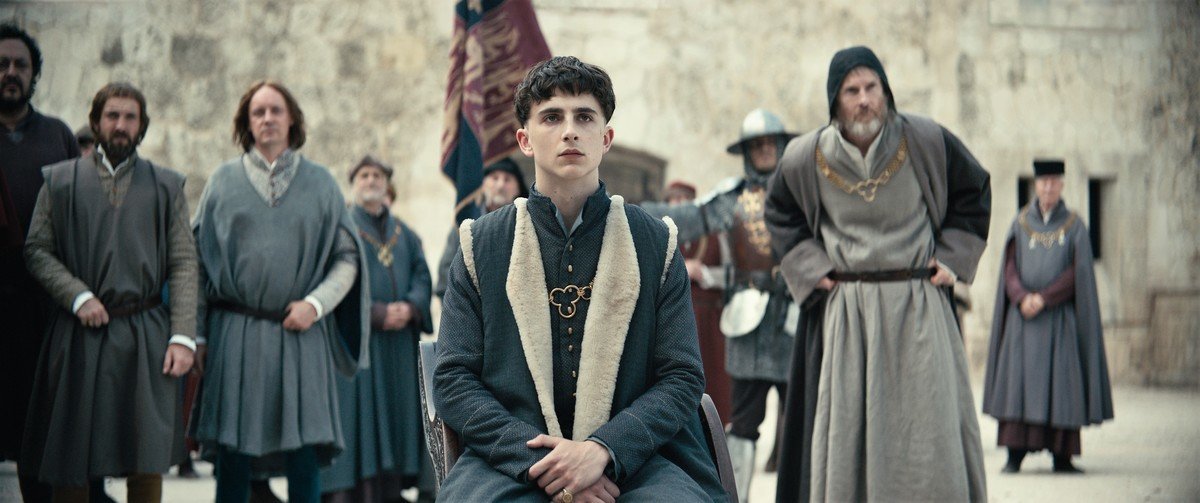

A broody, restrained, and verbally-attentive kind of beautiful, The King’s adaptation of Henry V wraps up the plot of Shakespeare’s play in an aesthetic blend of Braveheart and The Crown.
Considered as the offspring of the two, this latest Netflix might outwardly resemble its Mel-Gibson-starring father but in temperament is more like its Queen-Elizabeth-centred mother. The enjoyments it offers, in other words, are less of the epic, sword-rattling kind and more of the intellectual, indoorsy variety.
Thus, despite bookended overtures to action mainstays like hand-to-hand combat and protracted, armour-clanking battle sequences, the real heft of this feature falls upon reflecting on such things.
“Nothing stains the soul like killing,” a subdued Sir John Falstaff (Joel Edgerton) recollects, for example. “Never have I felt so vile, as standing victorious on the battlefield.”
Wordsworth famously described the origin of poetry as the spontaneous overflow of emotion recollected in tranquility, and however spontaneous his own verse might have been by today’s standards – the bulk of his considerable output are carefully constructed, metrically symmetrical sonnets – there is certainly evidence in his work of an attempt to depart from inherited, rigidly formalized conventions and express something relevant and fresh.
A similar impulse would seem to guide this film.
In an age that tends to lionize Shakespeare in those relatively rare moments he is remembered at all, often daring to trespass on hallowed literary ground only to the extent of dressing up his characters like hippies or swapping out Arden Wood for the Wild West, The King treads a carefully inconspicuous yet confident line between reverence and renovation, offering viewers a reimagined engagement with this long-celebrated tale.
And well it might: there is much to love in Shakespeare’s original. The change in tone between Prince Hall and Fallstaff, for example, in the transition from fellow-carousers to king and subject-adviser-needed-friend is classic and complex coming-of-age. The new monarch’s uncertainties about how to execute his office are likewise familiar to anyone who has suddenly been inducted into unanticipated responsibilities.
Shakespeare’s majestic buildup to the Battle of Agincourt, too, elevates the already intrinsically interesting underdog odds of the real life historical circumstances into an event of almost eternal significance. In all these matters and more, the film does well to venerate its prototype and not attempt foolishly to out-sing the Bard.
At the same time, Shakespeare is not above reproach, and this film makes bold to make up for some of his deficiencies. The choice to convert blank verse into prose, for instance, may not redress a shortcoming as such, however much it makes for more accessible and less-ostentatiously-demanding viewing.
Likewise, the multiplicity of physical settings that is possible in the cinema does much to dispel the stuffiness that sometimes creeps into Shakespeare, if perhaps only as one of the timeless vulnerabilities of theatre.
But the principle triumph of this film’s adaptation is its drama.
While Shakespeare ranks all but undoubtedly as foremost amongst the first ranks of the poets in our language, amongst dramatists his work might not even qualify amongst the third. His words as words are consistently powerful, insightful, surprising; his words as drama are often hackneyed, predictable, and quite often, frankly, boring. In fact, it might be beneficial to think of his plays not so much as drama at all, but as staged recitations of verse periodically interrupted by incidents.
In this regard The King, by comparison, shines. Conceived and executed principally as a drama – with plot development, character arc, and thematic designs taking precedence over discourse – the film, as story, flows. And it is a delight to watch.
It is also a delight to listen to – its dialogue concocted of an idiom reminiscently Shakespearean, that is, still antiquated in feel, yet relatively contemporary in content and cadence. How much is lost to (and gained by) this modification language might well be left to the individual viewer to decide.
Purists will perhaps object to any such tamperings with what they take to be sacrosanct scrawlings of the Bard. Yet even the fastidious intellects in the audience who are more enamoured of beauty wherever found than abstruse literary ideals will find much in this production to admire, and indeed, enjoy.
For my part, The King’s reinvention of something already good has only managed to make it better – both in the sense of birthing into the world something new and improved, as well as in casting the mind back to reconsider and appreciate the original even more.
(Originally published in The B.C. Catholic)
